Do Business Credit Cards Report to Personal Credit?
Author: Dylan Buckley
January 23, 2026
10 min read
TABLE OF CONTENTS
- 1. Most Business Credit Cards Report to Personal Credit
- 2. Reporting Payments vs. Just Reporting Delinquencies
- 3. Why You Do Not Want Business Credit Cards that Report to Personal Credit
- 4. Credit Utilization Dangers
- 5. How Many Credit Cards Can You Have?
- 6. Build Business Credit to Avoid Using Personal Credit
- 7. Build Business Credit and Get Capital with the FairFigure Card
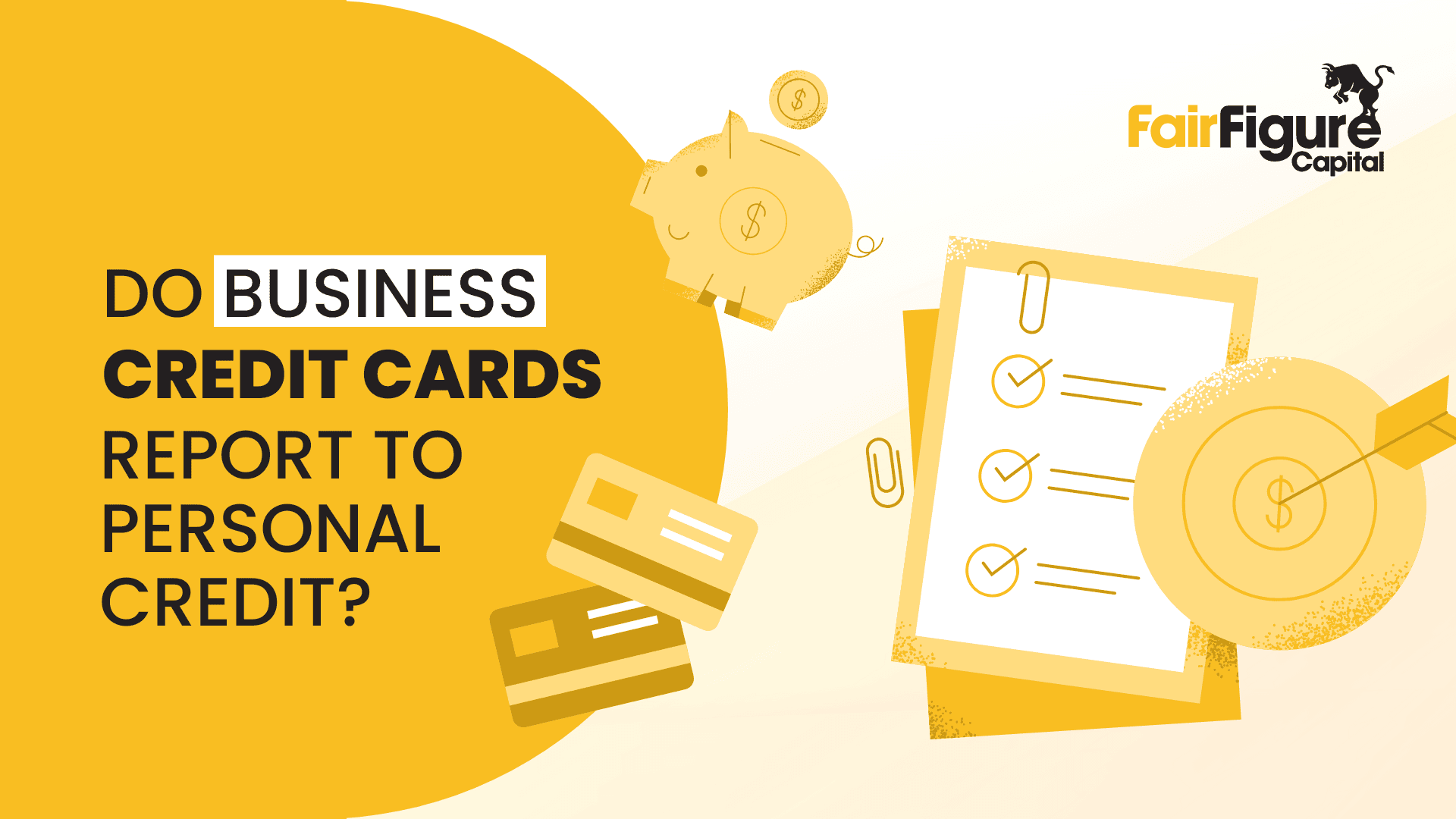
Start your credit building journey for your business

Business credit cards often do report to personal credit bureaus. Mainly, traditional business credit cards report card activity.
We explore which ones report activity, what activity they report, and what you can do to make sure your personal credit is safe while still financing your business.
Most Business Credit Cards Report to Personal Credit
The average business credit card from a traditional card issuer is going to report business credit card activity to personal credit bureaus. These include:
| Credit Card Issuer | Reports Positive Activity? | Reports Negative Activity? |
|---|---|---|
| American Express | No | Yes |
| Bank of America | No | No |
| Capital One | Yes (except Spark Cash Plus and Venture X Business Card) | Yes |
| Chase | No | Yes |
| Citi | No | No |
| Discover | Yes | Yes |
| U.S. Bank | No | No |
| Wells Fargo | No | No |
Knowing which cards report before you apply can help you avoid potential issues with your personal credit moving forward.
Keep in mind that these terms are always subject to change, and that exceptions always exist. Verifying credit reporting practices with each business credit card issuer before undergoing the application process will ensure you’re getting the right business credit card for your small business needs.
Reporting Payments vs. Just Reporting Delinquencies
As you can see from the table in the previous section, cards don’t always report the same card activity to each major consumer credit bureau.
Some cards will only report delinquencies to personal credit bureaus if you’re past due on your business credit card bills.
These are, of course, the most impactful. If you’re delinquent or severely delinquent on your business credit cards, your personal credit score will take a major hit as a result. This mark on your personal credit history will take a while to recover from.
Other cards might only report positive card activity (although most that do this also report delinquencies). Whenever you pay your monthly bill, this activity is reported to personal credit bureaus.
One might think this is beneficial. If you are paying off your card, you should see your personal credit score rise.
However, even positive activity can have a potential impact on your personal credit score that leaves you with worse credit. We’ll cover this in greater detail in the sections below.
Why You Do Not Want Business Credit Cards that Report to Personal Credit
The reason why you should avoid business credit cards that report to personal credit is the long-lasting effects they can have on your credit score.
A good or strong personal credit score is a necessity in day-to-day life.
Do you plan on buying a house in the future? If so, you need a solid personal credit score to be considered for the mortgages and mortgage terms you want.
Do you anticipate needing to buy a car in the near future? It’s going to be hard to finance that car affordably without a high personal credit score.
You especially need a strong personal credit score to pass a personal credit check if you’re a renter. Your options will be quite limited without strong credit.
The point is that having a business credit card that reports to personal credit is a surefire way to put your credit at risk.
Even positive reporting poses a serious risk to your financial security. Every small business owner needs to maintain a strong separation of business and personal finance.
The moment they become mixed, the potential for personal assets being seized, personal credit scores plummeting, and similar risks becomes uncomfortably high. Always opt for business credit cards with no personal credit check.
Credit Utilization Dangers
You might think, “Why would having a business credit card that reports positive card activity to personal credit bureaus be a bad thing?”
The answer lies in credit utilization.
The first and largest category that affects your FICO credit score is your payment history. Payment history is what most are concerned with, but the second category is just as important.
The second is amounts owed (credit utilization ratio), which makes up 30% of your score.
Let’s say that you have two personal credit cards with a total credit limit of $10,000. The rule of thumb is that you need to maintain a credit utilization ratio of less than 30%. You’ve kept your balances low, paid them off monthly, and kept your personal credit score high.
Now, let’s imagine that you apply for a business credit card. You receive a credit limit of $50,000, and you use almost all of that immediately. The card then reports your usage to your personal credit bureaus.
A personal credit bureau isn’t going to consider what type of card is being used. They’re not checking if you have a new personal card or business card.
Rather, they see that you have an additional $50,000 of usable credit, and you’ve used all of your available credit almost immediately. Your credit utilization ratio has skyrocketed.
In personal credit, that’s a red flag. You could be overextending yourself by maxing out your credit cards. We know that this is what you should be doing in order to take advantage of business financing, but your personal credit report won’t.
Changes in credit utilization are a hidden danger in business credit cards. Even if they only report positive activity, even that can backfire and hurt your personal credit score.
Because you will continue to max out your business credit card, your personal credit report will reflect this high usage so long as you have a card reporting to business credit bureaus.
Consider this before applying for a business credit card that you think might benefit your personal credit score and personal credit report.
How Many Credit Cards Can You Have?
You should generally be conservative when you’re managing personal credit cards. Ideally, you’ll want to have around three to five. Applying for one personal credit card after another could affect your personal credit and make it difficult to manage your finances.
Business credit cards are another story.
You can have as many business cards as you can safely manage.
For the average small business, that might mean starting out with one or two business cards that you use for business expenses.
Some businesses can manage 20 business cards or more.
This is certainly true if you’re giving cards to your staff. In that case, corporate cards will be well-suited for you.
Corporate cards typically don’t impact personal credit. They also allow you to create unlimited physical corporate card or virtual corporate card products for your employees. This is all while building credit with each major commercial credit bureau.
Many corporate card solutions come with strong spending controls so that you can ensure your cards are only being used for what they’re meant for without exceeding budget.
Build Business Credit to Avoid Using Personal Credit
So, if you can’t apply for most business credit cards without affecting personal credit, what do you do?
The key to making sure your personal credit becomes less of a deciding factor in business financing is to focus on business credit.
Working on building credit benefits you in several ways.
The first benefit lies in the solutions you’ll be using to build your business credit.
By turning to EIN-only credit products and accounts, you only use your business credit to apply and build your business credit with each successful payment.
Business credit cards that report to the business credit bureaus, for example, can keep personal credit out of the equation and help you build business credit history and your business credit score.
You also don’t have to worry about struggling to find business credit cards that pull TransUnion, business credit cards that pull Experian, or business credit cards that pull Equifax if you have only one or two personal credit scores to leverage.
Just make sure your chosen options require your business credit score only.
Once you’ve started building business credit, you’ll then be able to more easily qualify for credit solutions that might otherwise require a personal credit check.
An excellent example of this is the Shell Small Business Credit Card. Normally, you’d need to rely on personal credit to secure this card for your business.
But if you’re making at least $1 million annually, have a solid credit score with each major business credit bureau, and have a business that’s a year old, you could qualify with your business credit score instead.
After a while of building business credit, you’ll find that you’ll be able to access much higher limits.
Starting out, you’ll be relatively limited. You’ll rely heavily on net 30 accounts and revenue-based financing.
But as you work on your business credit, you can start tapping into tens or hundreds of thousands of dollars using good business credit practices and targeting the right opportunities.
Personal credit often comes into play when approaching business credit solutions. This is true in the sense of reporting and whether you’re asked for a personal credit check.
However, it’s more than possible to fund your business while protecting your personal credit.
Build Business Credit and Get Capital with the FairFigure Card
 Are you a new small business looking for financing? Do you want to protect your personal credit and build business credit instead? The FairFigure Card can help you reach both of these goals with one seamless business credit solution.
Are you a new small business looking for financing? Do you want to protect your personal credit and build business credit instead? The FairFigure Card can help you reach both of these goals with one seamless business credit solution.
The FairFigure Capital Card is an EIN-only business credit builder card. We’re the best business credit card if you want:
- Revenue-Based Financing: The FairFigure Capital Card extends funding based on your revenue. If you generate at least $2,500 a month (and have been in business for at least three months), you are eligible!
- Fewer Application Challenges: The FairFigure Capital Card comes with no personal credit check, no personal guarantee, no deposit, and no paperwork. It’s not a traditional business credit card, which means none of those typical business credit card challenges.
- Flexible Payback Terms: You get to choose between four-week and eight-week payback terms with our business card.
- TWO Tradelines: Both FairFigure Card transactions and your subscription are reported to the Small Business Financial Exchange, Equifax, Creditsafe, and the FairFigure Foundation Report to boost your business credit scores and build credit history.
- Business Credit Monitoring and Correction: The FairFigure Card is offered with our business credit monitoring services. Build your credit with your business card, monitor your progress, and address any errors on your business credit report with our support.
Sign up for FairFigure now to get the business credit support your small business deserves!
More articles
Read More >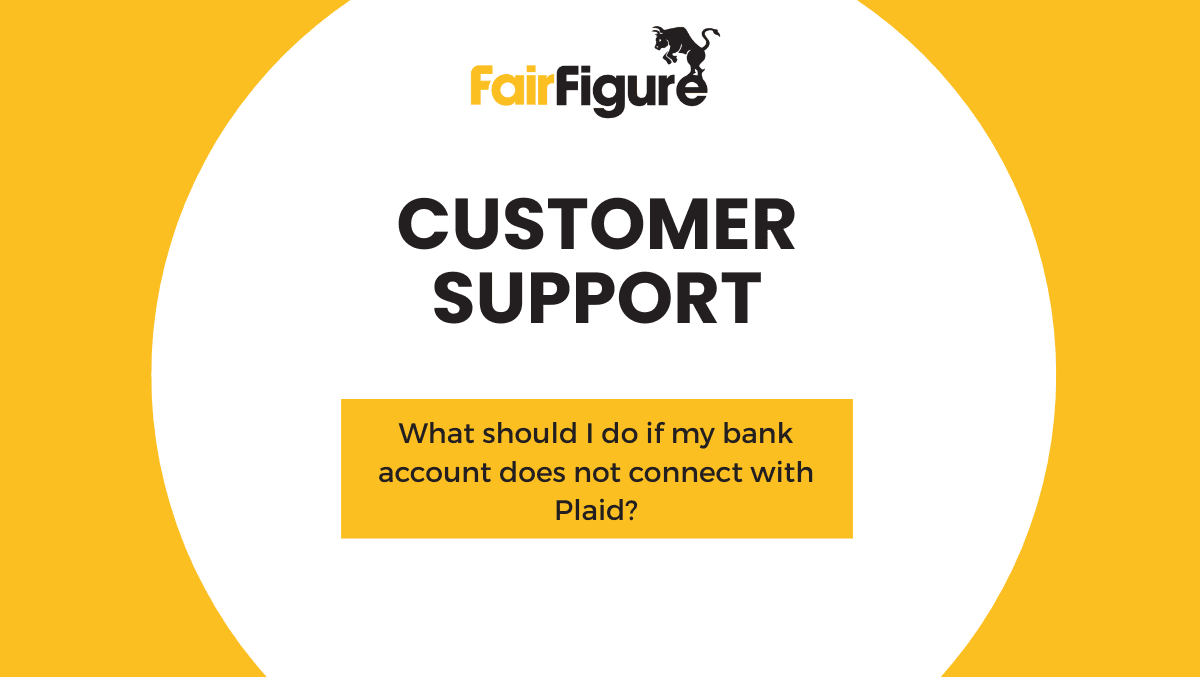
February 12, 2026
1 min read
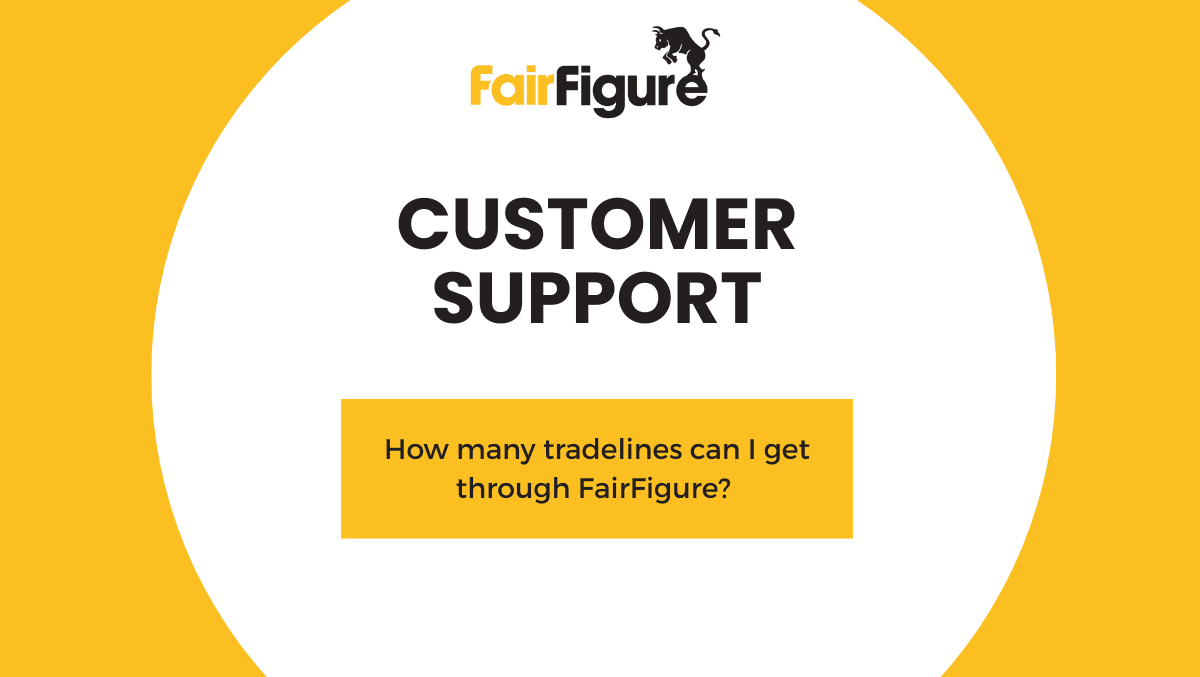
February 12, 2026
1 min read
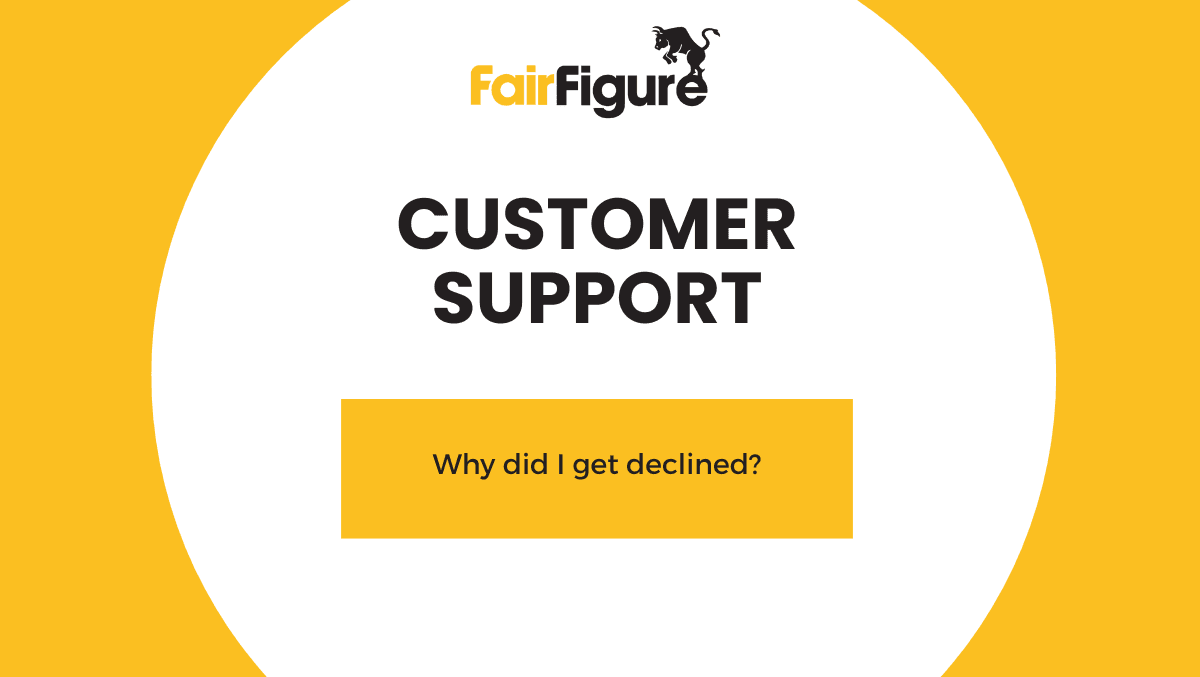
February 12, 2026
1 min read

Start your credit building journey for your business
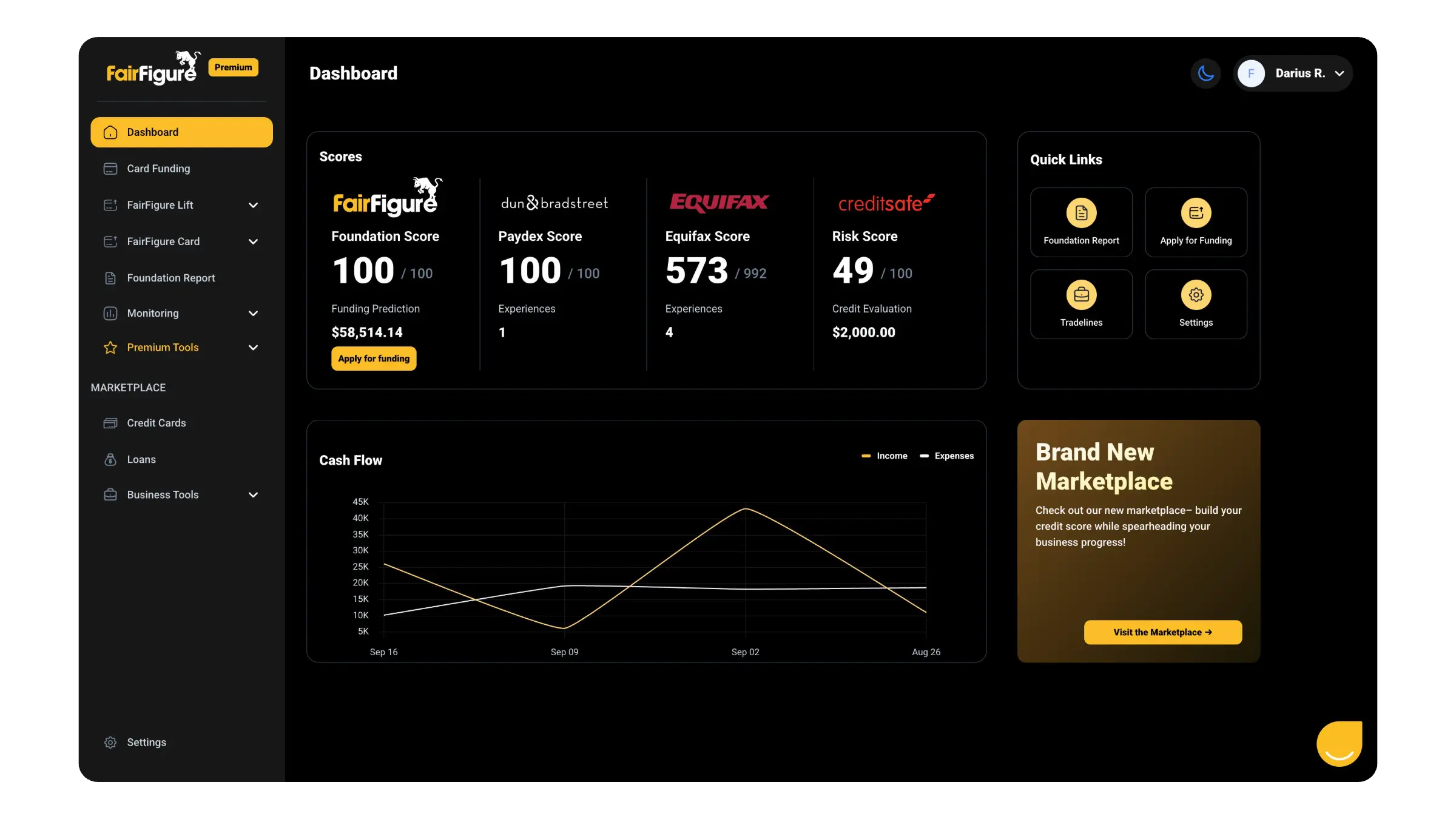
Start your credit journey now with FairFigure